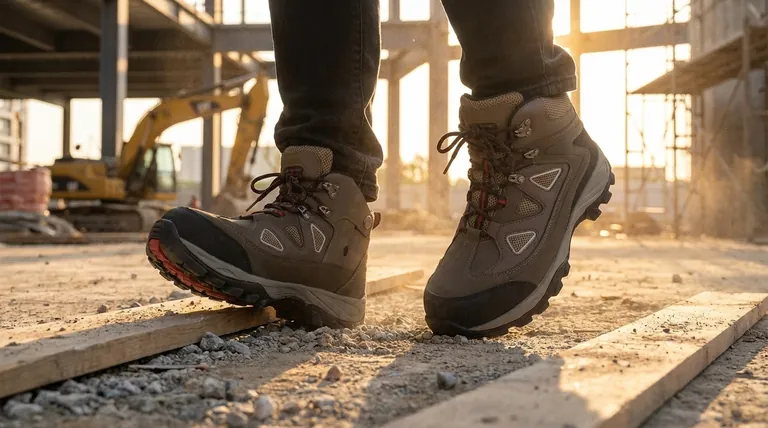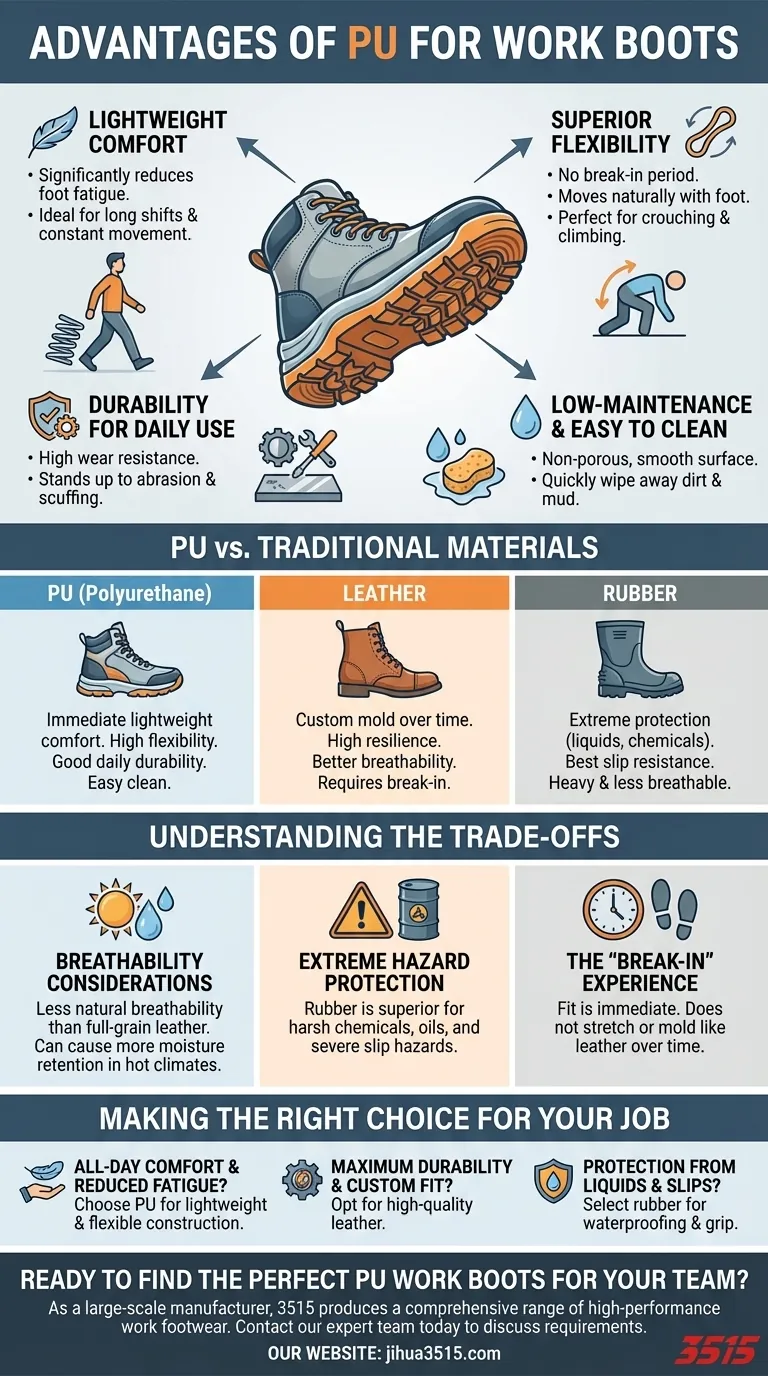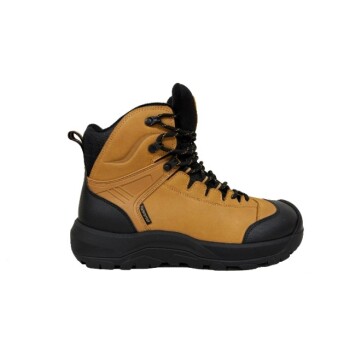The primary advantages of Polyurethane (PU) for work boots are its exceptional lightweight comfort, flexibility, and high wear resistance for daily use. Unlike heavier traditional materials, PU significantly reduces foot fatigue during long workdays while being durable and easy to maintain.
The core decision isn't whether PU is a "good" material, but whether its specific balance of lightweight comfort and modern durability is the right fit for your work environment when compared to the ruggedness of rubber or the classic resilience of leather.

The Core Benefits of Polyurethane (PU)
Polyurethane has become a popular choice in modern work boot construction because it addresses some of the most common user complaints about traditional footwear: weight and stiffness.
Unmatched Lightweight Comfort
The most immediate benefit of PU is its low weight. This directly translates to less energy expended with every step, significantly reducing fatigue over the course of a long shift.
This makes PU an ideal material for soles and midsoles in boots worn by workers who are constantly on the move.
Superior Flexibility and Elasticity
PU offers excellent flexibility right out of the box, requiring virtually no "break-in" period.
This elasticity allows the boot to move more naturally with your foot, preventing the stiffness that can lead to discomfort during prolonged periods of walking, crouching, or climbing.
Durability for Daily Use
Despite its light weight, PU exhibits high wear resistance. It stands up well to the abrasion and scuffing common in many work environments.
This makes it a reliable choice for daily wear, whether you work indoors on hard surfaces or in light outdoor conditions.
Low-Maintenance and Easy to Clean
PU has a non-porous, smooth surface. This characteristic makes PU boots remarkably easy to wipe clean of dirt, mud, and other debris, simplifying end-of-day maintenance.
How PU Compares to Traditional Materials
Understanding where PU excels requires comparing it directly to the two mainstays of work boot construction: leather and rubber. Each material serves a distinct purpose.
PU vs. Leather: The Comfort vs. Resilience Debate
Leather is prized for its exceptional durability, breathability, and ability to mold to the wearer's foot over time, creating a custom fit.
PU, in contrast, offers more immediate, lightweight comfort and flexibility from the very first wear. The trade-off is that PU will not conform to your foot in the same organic way as leather, and it typically offers less natural breathability.
PU vs. Rubber: The All-Day Wear vs. Extreme Protection Question
Rubber is the undisputed champion for waterproofing and slip resistance, especially against oils and chemicals. Its toughness provides a high degree of protection in hazardous environments.
However, rubber is significantly heavier and less breathable than PU. PU provides a better solution for all-day wear in less hazardous conditions where fatigue is a primary concern and absolute waterproofing is not the top priority.
Understanding the Trade-offs
No single material is perfect for every job. Being an informed buyer means acknowledging the potential limitations of PU.
Breathability Considerations
While modern designs have improved, PU as a synthetic material does not offer the same level of natural breathability as high-quality full-grain leather. In very hot climates, this can lead to more sweat and moisture retention.
Extreme Hazard Protection
For environments with significant exposure to harsh chemicals, sharp objects, or extreme slip hazards like oil slicks, a specialized heavy-duty rubber boot often remains the superior choice for maximum protection.
The 'Break-In' Experience
The fit you feel when you first try on a PU boot is largely the fit you will always have. Unlike leather, it does not stretch and mold to the unique shape of your foot over months of use.
Making the Right Choice for Your Job
Selecting the right boot material is about aligning its inherent properties with the demands of your work.
- If your primary focus is all-day comfort and reduced fatigue: Choose a boot with a PU sole for its lightweight and flexible construction, ideal for long hours on your feet in moderate conditions.
- If your primary focus is maximum durability and a custom fit: Opt for high-quality leather, which molds to your foot over time and offers superior breathability for varied climates.
- If your primary focus is protection from liquids and slips: Select rubber for its uncompromising waterproofing and specialized grip, especially in wet or hazardous environments.
Ultimately, understanding the unique strengths of each material empowers you to choose a work boot that actively supports your safety and comfort on the job.
Summary Table:
| Advantage | Key Benefit | Ideal For |
|---|---|---|
| Lightweight Comfort | Reduces foot fatigue during long shifts | Workers constantly on the move |
| Superior Flexibility | No break-in period; moves naturally with the foot | Jobs requiring crouching, climbing, or walking |
| Durability | High wear resistance against daily abrasion | Indoor or light outdoor work environments |
| Easy Maintenance | Non-porous surface is simple to wipe clean | Workers needing quick, end-of-day cleanup |
Ready to find the perfect PU work boots for your team?
As a large-scale manufacturer, 3515 produces a comprehensive range of high-performance work footwear for distributors, brand owners, and bulk clients. Our production capabilities encompass all types of safety boots, including advanced PU models designed for superior comfort and durability.
We can help you source or customize the ideal footwear solution that balances lightweight comfort with the demands of your specific work environment.
Contact our expert team today to discuss your requirements and receive a customized quotation.
Visual Guide

Related Products
- Safety Footwear Wholesale Manufacturer for Custom OEM/ODM Production
- Premium Flame-Retardant Waterproof Safety Boots and Shoes
- Wholesale Safety Footwear Manufacturer for Bulk & Custom OEM Orders
- High Performance Fire-Retardant Waterproof Safety Boots
- Premium Wholesale Tactical Style Safety Shoes Boots with Quick Lacing
People Also Ask
- How long can you wear safety boots? The Lifespan is Determined by Wear, Not Time
- How do safety shoes contribute to cost savings for companies? A Strategic Investment in Risk and Cost Management
- What are OSHA approved shoes? Understanding the Correct Standards for Workplace Safety
- Is it normal to wear shoes in the house? A Guide to Hygiene, Comfort & Culture
- Is safety-toe as good as steel toe? Choose the Right Protection for Your Job



















